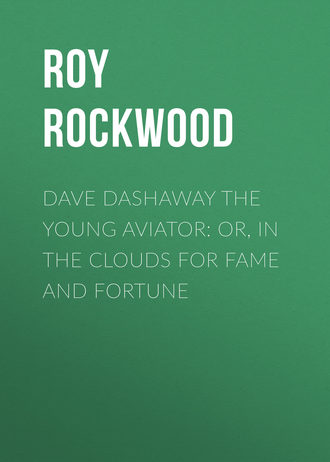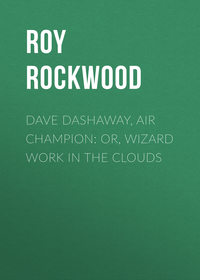 полная версия
полная версияDave Dashaway the Young Aviator: or, In the Clouds for Fame and Fortune

Dave Dashaway the Young Aviator; Or, In the Clouds for Fame and Fortune
CHAPTER I
DAVE DASHAWAY’S MODEL
“You don’t mean to say that new-fangled air ship of yours will fly, Dave Dashaway?”
“No, it’s only a model, as you see.”
“Would the real one go up, though?”
“It might. I hope so. But this is a start, anyway.”
“Yes, and a fine one,” said Ned Towner, enthusiastically. “You’re a smart boy, Dave, and everybody says so.”
“I wish my dear old father was living,” remarked Dave in a tone of sadness and regret. “There wasn’t much about sky sailing he didn’t know. In these times, when everybody is so interested in airships, he would be bound to make his mark.”
The two, manly-appearing youths stood in the loft of the dilapidated old barn of Silas Warner’s place in Brookville. It held a work bench and some tools, and on one end of the bench was the model at which they were looking.
It was neat enough and intricate enough, being made by a mere lad, to have attracted the attention of any inventor or workman. An outsider, however, would have been puzzled, for while its shape suggested a bird kite with an umbrella top, it had so many rods, joints and levers that a casual observer would have wondered what they were all there for.
Dave showed a good deal of pride in his model. It had cost him all his loose change to buy the material to construct it, and many a busy hour during the preceding few weeks. He sighed as he turned from it, with the words:
“All I need now is some silk to cover those wings. That finishes it.”
“Then what will you do?”
“Well,” replied Dave vaguely, “then I hope I can find some practical airship man who will tell me if it’s any good.”
“Say, it will be a fortune if it works, won’t it, Dave?” exclaimed Ned.
“Oh, hardly that. They are getting up so many new kinds all of the time. It would get me into the swim, though. All I want is to have a chance to make the acquaintance of some expert airman. I reckon the flying fever was born in me, Ned.”
“Well, that’s quite natural,” responded Ned. “Your father must have been famous in his line, according to all those scrap-book articles you showed me the other day.”
“Anyhow, I’m getting tired of the dull life I’m leading here,” went on Dave seriously. “I’d like to do something besides slave for a man who drives me to the limit, and amount to something in the world.”
“Good for you!” cried Ned, giving his friend and chum an encouraging slap on the back. “You’ll get there – you’re the kind of a boy that always does.”
“Hey, there! are you ever going to start?” rang out a harsh, complaining voice in the yard outside.
Dave hurriedly threw an old horse blanket over his model and glanced out of the window.
“It’s Mr. Warner,” he said, while Ned made a wry face. “I’ll have to be going.”
Old Silas Warner stood switching his cane around and growling out threats, as Dave reached the yard and crossed it to where a thin bony horse and an old rickety wagon stood. The vehicle held a dozen bags filled with potatoes, every one of which Dave had planted and dug as his hardened hands bore proof.
“You’ll quit wasting my time, Dave Dashaway,” carped the mean-faced old man, “or there’s going to be trouble.”
“I was just showing Ned about the loft,” explained Dave.
“Yah! Fine lot of more valuable time you’ve been wasting there, too,” snorted old Warner. “I’ll put a stop to some of it, you mark me. Now then, you get those bags of taters down to Swain’s warehouse and back again afore six o’clock, or you’ll get no supper. There’s a lot more of those taters to dig, but an hour or two this evening will finish them.”
Dave’s face was set and indignant, but he passed no more words with the unreasonable old man who called himself, and was in fact, legally his guardian.
“I’ll keep you company as far as our house,” said Ned, as Dave got up into the wagon seat, and he climbed up beside his friend, heedless of the grumblings of the old man about over loading.
“He’s a pretty mean old fellow,” flared out Ned, as they drove out of the yard and into the country road leading towards the town. “It’s the talk of the neighborhood, the way that old miser makes you work.”
“I wouldn’t mind the work if he would only treat me half human,” replied Dave in a subdued tone.
“It isn’t in him to do it,” scolded Ned. “If I was in your place I’d just cut out, and let him find some other fellow to do his slaving. Why, my folks say your father left enough to take care of you in a good way. And send you to school, and all that. I’d find out my legal rights, if I were you, and I’d fetch that old fellow to time.”
“It would be no use, Ned,” declared Dave. “I tried it once. I went over to Brocton, where the lawyer of my father’s estate lives, and had a talk with him.”
“What did he say?”
“He said that my father had left no property except the old hotel at Brocton. It is old, for a fact, and needs lots of repairs, and the lawyer says that this takes most of the income and makes the rent amount to almost nothing. I found out, though, that the lawyer is a relative of Mr. Warner, and that Warner gives most of the repairing jobs to other relatives of his. I went and saw the court judge, and he told me that Mr. Warner’s report, made each year, showed up clear and straight.”
“Judge another relative of old Warner?” insinuated Ned.
“I shouldn’t wonder.”
“Neither would I. It’s strange to me, though, Dave, that your father ever made such a notorious old skinflint your guardian.”
“He didn’t,” asserted Dave.
“Who did, then?”
“The court, and I had no voice in it. Mr. Warner let me stay at the school I was attending when my father died, for about a year. Then he claimed the estate couldn’t bear the expense, and he has had me home ever since.”
“Why don’t they sell the old hotel, and give you a chance to live like other boys who are heirs?” demanded Ned, in his ardent, innocent way.
“Mr. Warner says the property can’t be sold till I am of age,” explained Dave. “That time I went away and got work in the city, I even sent Mr. Warner half of what I earned, but he sent the sheriff after me, made me come home, and said if I tried it again he would send me to a reformatory till I was twenty-one.”
“Say that’s terrible!” cried Ned, rousing up in his honest wrath. “Oh, say – look there!”
“Whoa!” shouted Dave, but there was no need of the mandate. In sudden excitement and surprise he had pulled old Dobbin up dead short. Then he followed the direction indicated by the pointing finger of his companion. Both sat staring fixedly over their heads. The air was filled with a faint whizzing sound, and the object that made it came within their view for just a minute. Then it passed swiftly beyond their range of vision where the high trees lining the road intervened.
“An airship – a real airship!” cried Ned with bated breath.
“Yes. It must have come from the big aero meet at Fairfield,” said Dave.
“Is there one there?”
“Yes. I read about it in the paper.”
Both Dave and Ned had seen an airship before. Besides two that had passed over the town the day previous, they had once witnessed an ascent at a circus at Brocton.
Every nerve in Dave’s body was thrilling with animation. He had dropped the lines, and Dobbin had wandered to the side of the road seeking for grass, nearly tipping over the load. Dave righted the wagon.
“Say,” spoke Ned, “stop at the house, will you?”
“What for?” inquired Dave.
“I want to ask the folks to let me go to town with you.”
“I’ll be glad to have you, Ned.”
“All right. You know the common is right on top of the hill, and one of the fellows said they could watch the airships yesterday for miles and miles.”
A turn in the highway brought the boys to the Towner place. Ned ran into the house and soon returned all satisfaction and excitement, his pockets filled with cookies and apples.
“Mother says I can go with you, Dave,” he said. “I can help you unload, and we can drive over to the town common and join the crowds.”
Dave’s head was full of airships, and the incident of the hour made him forget his troubles. He and Ned chatted and lunched animatedly all the way to Brookville.
The business part of the little town was located on a hill, as Ned had said, but they did not go there at once. The warehouse where Dave was to deliver his load of potatoes was near the railroad, and there they drove.
They found no one in charge of the office, and had to wait till the proprietor arrived, which was nearly an hour later. It was quite six o’clock before they got the potatoes unloaded. Then Dave drove up the hill.
Quite a crowd was gathered in the public square. The boys hitched old Dobbin near the post office and joined the throng.
Everybody was talking airships. It seemed that half-a-dozen had passed in full sight. Three of them had sailed directly over the town. One of them had dropped about a hundred printed dodgers, telling about the aero meet at Fairfield, and Dave was glad to get hold of one of these.
The excited throng was in great expectation of the appearance of another airship. It was getting on towards meal time, and quite a number had left the common, when a chorus of sound echoed out:
“A – ah!”
“There’s another one.”
“Hurrah – look! look!”
“A – a – ah!”
The last utterance expressed disappointment. A swift sailing aeroplane had come into view, circled, and was lost to sight over the crest of a distant hill.
There was a great attraction for the chums in the crowd and bustle about the common. It was quite dusk before they started away. Dave realized that he would have to account for every minute of his time, and expected a scene when he got back home. He had seen so much, however, and heard so much talk on his favorite theme, airships, that a glimmering idea came to him that he was soon to know more of them.
Dave kept up his spirits bravely, and he and Ned chatted over dreams and plans to find a chance to get over to Fairfield some day soon, and view all the glories of the great aero meet close at hand.
It had become quite dark by the time they neared the turn in the road leading to the Towner place. Old Dobbin was plodding along the dusty road at his usual leisurely gait, when suddenly Ned stretched out his hand and caught the arm of his comrade in a great state of excitement.
“Whoa!” he cried. “Do you hear that, Dave?”
“Sure enough,” responded Dave, checking the horse, and both of them sat rigid on the wagon seat and stared up into the sky.
“It’s another one of them,” said Ned. “Listen.”
There was a quick snappy sound, like the sharp popping of an exhaust.
There was a flashing streamer of light, outlining a dark object that both the entranced lads knew to be a belated airship making its way homeward.
At that moment something swished through the air. Dave did not see it, he rather felt it. Before his senses had fairly taken it in, however, old Dobbin made a jump.
Ten feet ahead the slow going animal plunged, as Dave had never seen him do before. Then he made an affrighted veer. Over into the ditch went the crazy old vehicle with a crash. Dave, clinging to the seat, was simply flung sideways, but his companion was lifted bodily. Head over heels out of the wagon went Ned, landing sprawling in the mud.
CHAPTER II
FROM THE CLOUDS
“What’s happened?” shouted out Ned Towner, in dismay and confusion.
“Dobbin ran away, that’s all,” replied Dave quickly.
“Why?” asked Ned, righting himself and looking around him in a puzzled way.
“Something struck him.”
Dave made the declaration as he dismounted cautiously from the wagon. Dobbin lay on his side as if perfectly satisfied with a rest in the soft dirt. One wheel of the wagon was splintered to pieces and the wagon box had caved in on one side.
“Hold his head till I slip the traces,” ordered Dave.
They got Dobbin to his feet and managed to pull the wagon up the slight slant.
“Whew!” whistled Ned, “here’s a pretty bad wreck.”
“Yes,” assented Dave soberly. “I don’t know what Mr. Warner will say about it.”
“Let him say!” flared out Ned. “The old thing was ready for the junk pile, long ago.”
“That won’t help much,” said Dave.
As he spoke Dave went over to a stretch of broken fence and dragged a long rail up to the wagon. This he strapped to the hub of the broken wheel.
“I guess the wagon will drag home,” he observed, as he hitched up Dobbin anew, “but we will have to walk.”
“Say,” broke in Ned suddenly, “you think something hit the horse and started him up?”
“I am sure of that,” declared Dave.
“Then I’ll bet it’s one of those Bolgers. See, we’re right at the end of their lot. You know they pelted you once before?”
“I know that,” admitted Dave, “but I don’t see or hear anything of them just now.”
“Oh, they’d lay in ambush in that brush yonder all night to play a trick on either of us,” insisted Ned.
The Bolgers were a family crowd very numerous and troublesome. They had often pestered Dave in the past, and, aroused by the suggestion of his comrade, Dave walked back the road a dozen feet or so, peering sharply into the straggly brush lining it.
“What is it, Dave?” inquired Ned, as his friend uttered a quick cry. He noticed that Dave had come to a short stop and was stooping over in the road.
“My foot kicked something,” explained Dave, groping about. “Why, I wonder what this is?”
“What?” put in Ned curiously.
“It’s a bundle of some kind.”
“Why, yes,” added Ned, peering sharply at the object in Dave’s hand. “It looks like a rolled-up sweater.”
“Some one must have dropped it from a wagon,” said Dave. “There’s something else here than a sweater, though.”
“Let’s have a look at it,” suggested Ned eagerly.
“Hold on,” said Dave, as his comrade reached out to unroll the wadded-up bundle. “It’s too dark to make out anything plain.”
The moon had not yet come up, and on that tree-lined road it was pretty dark. Dave moved up to the wagon. Under the front seat was an oil lantern, and he secured this and lighted it.
“Why, I should say there was something else besides a sweater!” exclaimed Ned excitedly, as Dave unrolled the garment on the seat cushion.
“Yes, there’s a pocket book,” said Dave.
“Open it – let’s see what’s in it,” suggested Ned.
“A watch,” spoke Dave.
“And some money. Why, this is a big find, Dave! Wonder who lost it? And look, there’s a medal – a gold medal.”
Dave took this up and inspected it closely. His fingers trembled with excitement as he did so, for the pretty bauble suggested the theme nearest and dearest to his heart.
The main plate of the medal was chased with the outline of an airship. Pendant from this by two tiny gold chains was a little strip of metal, and on this was inscribed the words: “Presented to Robert A. King by the C. A. A. First Endurance Prize.”
“Why, I know where this came from!” cried Dave suddenly.
“Do you?”
“Yes.”
“Where?”
“It fell out of that airship that just went over us. It was this bundle that hit the horse and made him run away.”
“Why – why – ” stammered Ned in great excitement. “Do you think so?”
“I am sure of it. That name there, too – ‘King’. I read about him being down at the meet at Fairfield in a paper yesterday, and ‘C. A. A.’ means Central Aero Association.”
“Is there much money, Dave?” questioned Ned.
“About fifty dollars.”
“What are you going to do with it?”
“Return it to the owner.”
“Of course, but how are you going to get it to him?”
“I’ll find a way,” replied Dave thoughtfully. “He will be pretty glad to get back that medal.”
“I should think so, too.”
Dave carefully replaced the pocket book in the sweater, rolled it up, and stowed it in the corner of the seat space. Then he took up the lines and started up Dobbin, both he and Ned walking along beside the wagon.
Ned had been dazzled with the sight of the valuable contents of the sweater bundle, and could talk of nothing else. Dave let him talk, and did not say much. He had the broken wagon and a thought of the way that mishap would stir up his guardian on his mind, and it was not a very pleasant thing to think about. At the same time, Dave had a vague glimmering idea that events were framing up that brought him in closer touch all the time with aeronautics.
“Say, Dave, I’ll go home with you if you like,” suggested Ned, as they neared the Towner place.
“Thank you, Ned, but I don’t think you had better.”
“I could help you put up the horse and all that, you know.”
“No,” responded Dave definitely. “There’s a storm to face, and I might just as well face it alone and have it over with.”
“Tell me what you decide to do about getting that stuff back to the airship man, won’t you?”
“I certainly shall.”
“I wish you could arrange to take it to this Mr. King yourself, Dave,” went on Ned. “He would be sure to appreciate it, and help you get an insight into the doings down at the aero meet in which you are so interested. Well, see you to-morrow! Good night!”
“Good night, Ned,” responded Dave, and started on his lonely way. He wondered how his guardian would take his late coming and the broken wagon. As the rail supporting the broken wheel clattered over the rutty road leading into the yard, Dave drew Dobbin to a halt and stared up wonderingly at the one side window of the barn loft.
There Dave saw a light, or rather the receding radiance of a light, as if some person was just descending the stairs with a lantern. It was a very unusual circumstance for anybody to visit the loft except himself. He had always used it as a work room, the grain and hay being stored in a shed built onto the stable. The next moment Mr. Warner came out from the barn.
He carried a lantern in one hand. In the other was a big sledge hammer. The old man looked ugly, excited and was out of breath. The moment he caught sight of Dave he hurried forward, dropping the hammer.
“Aha! so you’ve got home at last, have you?” he snarled.
“Yes, sir. I’m afraid I am a little late,” said Dave.
“A little late – a little late!” snarled the old man. “You’re two hours behind time. Now then, I want to know what this means?”
“I was delayed in finding Mr. Swain at the warehouse,” explained Dave, “but I don’t make that an excuse. There were some airships going over the town. Everybody was looking at them, and I couldn’t help doing it myself.”
“Airships!” shouted Warner. “Well, there’s one airship, as you call ’em, that won’t fill your head with nonsense any more.”
“What do you mean?” inquired Dave anxiously.
“I mean that I won’t stand you loitering and wasting my time any more,” declared Dave’s guardian. “I mean that I’ve settled one end of your nonsense. I’ve smashed that crazy model of yours, and if I hear any more of this airship rot, I’ll give you the trouncing of your life.”
“You’ve – smashed – my – model!” gasped Dave, in unspeakable amazement and dismay.
“Yes, I have. What about it?” challenged the irate old tyrant.
“You dared to – ” began Dave, his face on fire, and he felt as if he could no longer control himself. Then fortunately at just that moment there was a diversion. His guardian’s eye chanced to fall upon the dismantled wagon with one wheel gone and the box supported by the dragging fence rail.
With a shriek of rage that was almost a bellow he grabbed Dave by the arm and dragged him up to the wrecked vehicle.
“Who did that?” he raged. “Don’t tell me – it’s a piece of spite work! Who did that, I say?”
CHAPTER III
BREAKING AWAY
Dave Dashaway was almost speechless. His tyrant master had struck him in a tender spot, indeed. Not that Dave had ever been foolish enough to build extravagant hopes on his model. It had been all guess work and an experiment. However, his soul had been wrapped up in his labor, he had been proud and pleased with his progress as an inventor, and that mean, vengeful act of the old man roused him up terribly.
“What busted that wagon?” demanded Mr. Warner, grasping Dave’s arm till the pain was unbearable.
Dave jerked loose, and panting and angry-faced confronted his guardian with a look that made the old man hesitate. His lip trembled, but he held his speech as steady as he could, as he replied:
“Dobbin got scared and ran into the ditch.”
“With your star-gazing after those airships I’ll warrant.”
This was so near the truth that Dave did not reply.
“What do you suppose will pay for all that damage to that wagon?” demanded Warner.
“I suppose my hard work will,” bluntly replied Dave.
“Your hard work – bah! It looks as if you was worked hard, fritting half of the afternoon away, spending hours and hours on that worthless piece of trumpery up in the barn loft. I’ve settled for good and all. Now you put up that horse, get your supper, and go to your room. You dare to leave it till I say so, and I’ll just call the sheriff up here again, and see what he says about affairs.”
This was an old-time threat of his guardian. It was worn so threadbare that Dave did not pay much attention to it. He proceeded silently about his task, unhitched Dobbin, led him to his stall, and made him comfortable for the night with feed and bedding.
As Dave came out into the yard again he made a speedy run for the wagon. His guardian had been poking about the vehicle, and had discovered the sweater roll. This he now held, turning it over and over in his hand and viewing it curiously.
“Here!” shouted Dave, “that’s mine.”
“Oh, is it?” snapped the old man, holding the bundle out of Dave’s reach. “What is it? I’m going to see.”
“I don’t mean that it belongs to me,” Dave corrected himself, “but I found it.”
“What is it?”
“It fell out of an airship. It lighted on Dobbin’s back. That’s what made him run away.”
“Fell from an airship?” repeated old Warner with a sniff of disbelief. “Romancing, hey?”
“No, I am not, I am telling you the truth,” persisted Dave.
“Hello! hello! Here, what’s this?”
Mr. Warner had opened the sweater. His miserly old eyes fairly gloated over the pocket book and its contents. His thin cruel lips moved as if he was smacking them over a meal.
“You found this, you say?” he inquired.
“Yes, I did,” responded Dave brusquely, none too well pleased with the way things had turned out.
“Well, finders keepers!” chuckled the old man with a cunning laugh.
“Nobody is going to have that pocket book but the owner,” said Dave staunchly.
“I’ll arrange about that, you young insolent!” retorted Mr. Warner.
“You’ll have to, in the right way, too,” asserted Dave, who was quite nettled.
“Eh – what’s that?” shouted the old man.
“Just what I said. If you will look at that medal in that pocket book, you will find that the owner’s name is on it. It is ‘Robert King’. All you’ve got to do is to send his property back to him. I happen to know that he is at Fairfield now, and a letter directed there would reach him.”
“Say,” blurted out old Warner, “I know what to do, I guess, about my own business.”
“This is my business, too,” insisted Dave. “I found that property, and I’m honest enough to want to get it right back to the man who lost it.”
“You get into that house quick as you can, and mind your own business and keep your mouth shut, or I’ll make it pretty interesting for you,” bawled the old man.
Dave closed his lips tightly. He had gone through a pretty trying ordeal. It had made him almost desperate. It had come so thick and fast, one indignity after another, that Dave had not found time to break down. His just wrath over the destruction of the model was lessened by the appropriation of the sweater bundle.
“There’s something I won’t stand,” declared Dave, as he made his way into the house. “I know who that property belongs to, and if Mr. Warner tries any tricks, I’ll expose him.”
Dave felt sure that his tyrant master would not do the square thing. He might not dare to keep the pocket book and its contents and say nothing about it. Dave felt sure, however, that in any event Mr. Warner would not give it up without a big reward. This humiliated Dave, somehow, on account of his father and his own liking for aeronautics. Dave felt more than kindly to one of that profession, and would have been glad to return the lost pocket book for nothing.







